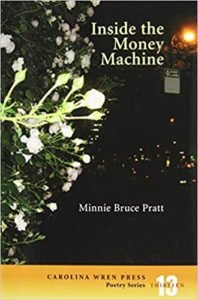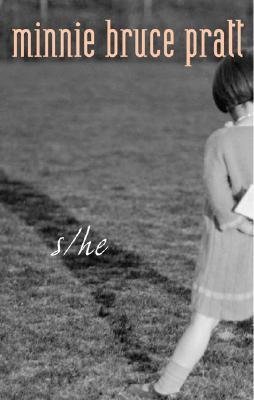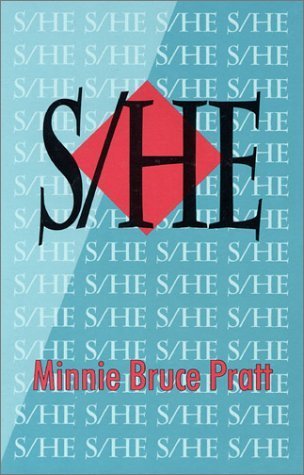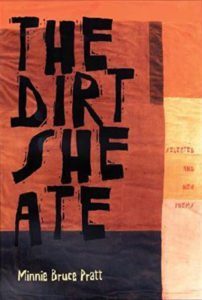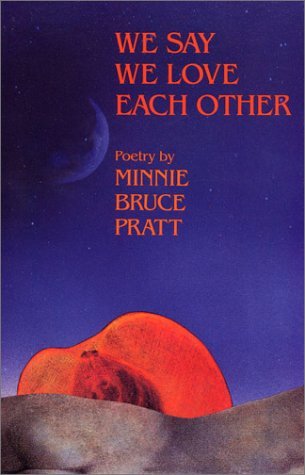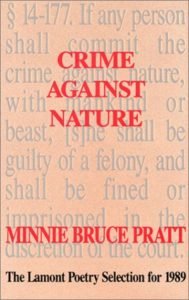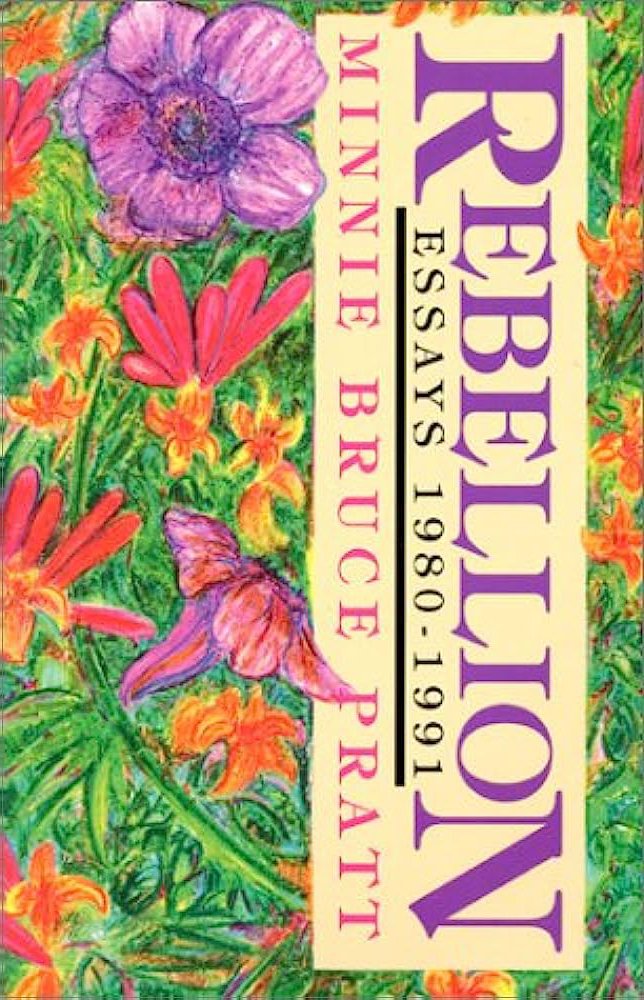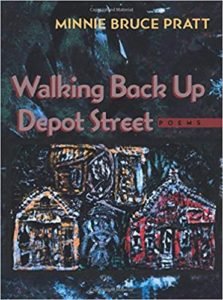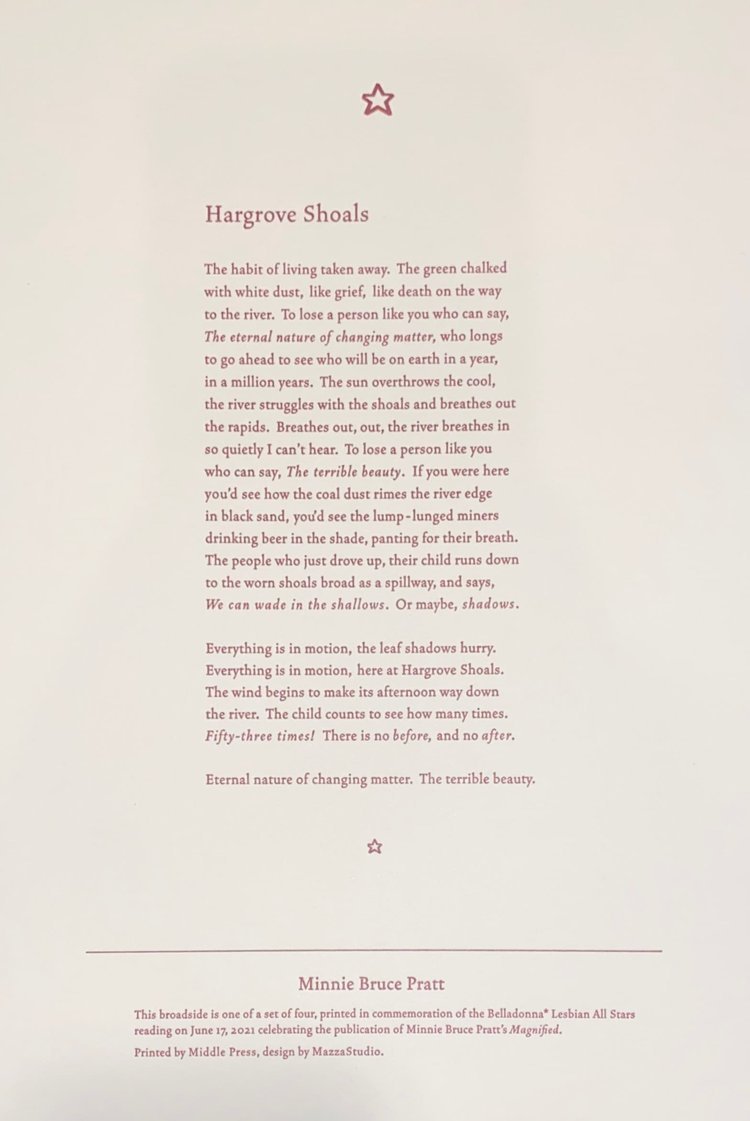Minnie Bruce Pratt
(September 12, 1946 – July 2, 2023)
"So, it's farewell and go, little book, and who will handle my life next,
and not know it? Then, it's back. Back up the stairs. Sit at my desk."
—Minnie Bruce Pratt, from The Money Machine: Selected Poems
Minnie Bruce Pratt at Take Back the Night March, Syracuse, N.Y., 2008. Photo by Rachel Fus © 2008
Oh Death
Someone sang, Oh death! Oh death! Won't you
pass me over for another day? Someone said, I
dreamed of you last night. I dreamed you
were telling me your whole life story.
Whole. Whorled. Welkin, winkle, wrinkle.
The loop of time holds us all together.
The pile of laundry on the bed. You
folding socks one inside the other. We
have had this day, and now this night.
The clothes are put away, and from the bed we see
the moon folding light into darkness, not death.
—Minnie Bruce Pratt, from Magnified, Wesleyan University Press, 2021
Dear Friends,
I’ll write more tomorrow but I want to mark this loss this day in this community before I knock off to bed.
Minnie Bruce Pratt (1946-2023) died today July 2 at around 3 a.m. in Syracuse, New York, being cared for by Friends of Dorothy, the hospice space that is hosted by her close friends Nick Orth and Michael DeSalvo and her son Ben Weaver and daughter out-law Katie Kent (she has another son Ransom Weaver, and daughter-in-law Laurel Weaver who were also close to her during her sudden illness.) I learned of Minnie Bruce’s bad prognosis just 10 days ago and made my way with Bill Mazza - also a close friend of hers - to go to see her in Syracuse on Monday.
I met Minnie Bruce in 1985, just as Yours In Struggle came out, at a Feminist Writers Confab in Albany NY. She was a big star to me and was also warm and approachable. Irena Klepfisz and Elly Bulkin and Jan Clausen were also at the conference. I wasn’t a poet then but I was a new feminist and my body was stirring, stirring. Ten years later I’d returned from Mexico and found myself writing poems in my sleep. I went to a Randall Kenan (1963-2020) reading at the Poetry Project and there was Minnie Bruce. I had a job at Shades of Lavender, the lesbian outpost of The Brooklyn AIDS Task Force. I went up to Minnie Bruce shaking with nervousness and asked her if she’d come to Brooklyn to read. She did and we became friends. It was in the early part of her relationship/marriage to Leslie Feinberg (1949-2014) and their life together on Chestnut Street in Jersey City. We began to meet to get our nails done in the West Village, near the PATH train. So many of the things Minnie Bruce told me are things that have stuck in my mind, that as she got older it was harder and harder to make enough money, for example. She and Leslie remained financially precarious - despite being rock stars of the radical gender queer foundational action and activism upon which so many of our lives depend and have depended. I loved Minnie Bruce and Minnie Bruce’s work fiercely and could not fully believe my good fortune of being part of a non-hierarchical fabric that allowed my Hera to be my friend too. She was the first person who supported me and my poetry, wrote me letters of recommendation that got me into graduate school and residencies and enabled my imagination to make the life I have now. She was my mentor and my femme queen.
—Rachel Levitsky, July 2, 2023
A little more for Minnie Bruce (July 8, 2023), whose website home page begins:
WELCOME
Come in and make yourself at home. If we haven’t met before, then the first thing you should know about me is my name. I go by Minnie Bruce—it’s a double-first-name, just like Fannie Lou or Ana María—so do call me by both—“Minnie Bruce.”
As you might imagine, this slight but massive distinction required of MBP and any of us that loved her, an ongoing and repetitive insistence that the world get the words of her name right, much like the struggle of trans and nonbinary folx whose names and pronouns are unfamiliar. It was also for sure a poets’ task, and in the spirit of the everyday small but large work of a poet who is an activist communist, a southern white woman whose core identity and work are anti-racist and anti-imperialist, and a femme who loved masculines who is a feminist and Lesbian committed to liberation and autonomy. Reading Minnie Bruce’s magnificent, epic of a most radical public-making-of-a-private-life memoir, Marrying Leslie, my June 2023 pleasure task turning devastatingly uncanny by her sudden passing while I read to prepare comments for her towards publication (how can I not talk to her about its everything and the way it all flows together, the queer lovemaking, the marching, the healthcare and its tortures, the aging, the dreams, the dreams, the discussion of dreams, the comments from the audience – I wake in the morning thinking of things I will discuss with her, can’t), it becomes clear that Minnie Bruce took nothing for granted as established. And though hers is a life of constancy, consistency, reliability, longstandingness of home (she re-made for herself her childhood home when her elders in Alabama passed and left it to her; returned to it often to write, one of the meanings behind her volume, Walking Back Up Depot Street) to which she brings an ever present consciousness, Marx’s “all that solid melts into air” or it’s more apt translation, “all that is established and stable dissolves away.”
She took and could take nothing for granted, not even holding her children, taken from her when she came out as a Lesbian (see Crime Against Nature, 1990). So, from the first moment of meeting her, I recall hearing her gently correct anyone who said Minnie, leading them, to Minnie Bruce. This gentle firmness is in the simplicity of the philosophic profundity of her poems and essays, what our mutual friend and Belladonna* stalwart, artist Bill Mazza most precisely names “her deceptively accessible writing.” She paid for this accessibility – too much poet for the politicos, too many politics for the poetry establishment – it was all there interwoven in an interbeing of fierce determination, constant carrying, keeping it all up in the air, in front at the front of everyday struggle toward political justice and self-determination. The presence of everything is not accidental, she wrote lists. And yet, one of the things that I keep thinking about as I read the memoir, reading her poetic wildness, freedom, is a moment during the time we reconnected, maybe in the late 90’s, her bursting out with pleasure saying, “I just love the work of Bruce Andrews!” Bruce Andrews is one of the founders of the L-A-N-G-U-A-G-E school. His work is visceral, phonemic, abrupt, and multiple.
In the way that great theory is world opening/making, Minnie Bruce’s philosophic profundity was the aspect that grabbed me most while reading her recent Wesleyan poetry volume, magnified in 2020, in order to write a blurb. Magnified addresses life after her spouse/partner of 22 years, the writer, transgender warrior, communist activist Leslie Feinberg’s untimely death at the age of 65 in 2014. About the volume, I ended up writing a short blurb that pointed to Minnie Bruce’s “vision for revolutionary afterlife.”
From that volume, page 86, the poem, “Field of Vision Test”
We let the stars fall down on us for hours. The fire
in us leaps to meet debris disintegrated into light.
The tense is present with the we, not the difficult we that Bill and Minnie Bruce argue about but the we of the political lovers in love and battle, between the worlds of life and death understanding the battle to be intertwined, as they are, in both. The both both of the poet in the world, the multiple name, gender, the infinitely expanding and breaking heart.
Rest in Power and Love Minnie Bruce Pratt. Everything you did worked. I love you.
—Rachel Levitsky
“Oh Death” is the first poem of “Hourglass” the first section of Magnified, Minnie Bruce Pratt’s most recent collection of poems, a collection that walks us through her process of living with—and then living without—her longterm partner Leslie Feinberg. The language observational, Magnified details the material conditions of the natural world, how objects and events in that world mark human lives, and how she/we readers anchor to those moments in experience and memory. Unsurprisingly, her deceptively accessible writing is communism and love.
Sustained in print, we’ve lost Minnie Bruce’s precise, concise, razor-sharp, easy-laughing, serious-staring, living voice. Also in details, Minnie Bruce died at Friends of Dorothy house in Syracuse, the home and hospice of her (and my) dear friends Michael DeSalvo and Nick Orth, and with the ongoing company of family.
For those who didn’t know her, and in the all-cap words she wanted seen first-and-foremost on her website we designed together, Minnie Bruce is/was: POET ACTIVIST LGBTQ+ ANTI-RACIST ANTI-IMPERIALIST.
Minnie Bruce had many gifts, not the least among them was her seemingly effortless ability to meet people where they were in conversation, challenging in words most likely to be heard, offering thoughtful alternatives to the problematic, and remaining present. ‘Open’ and ‘empathy’ are sometimes revolutions.
I was lucky to get to know Minnie Bruce best in recent years, spending hours talking in person or on the phone. Even during the early years of the ongoing pandemic Minnie Bruce was one of the few people I saw in person (when she was in Syracuse), most often in the Friends of Dorothy porch or backyard, and most holidays.
At that time I was traveling north to visit / struggle to care for my aged father and, after he died, to tie up the material and legal remains of his working man’s life. More intimate than politics, Minnie Bruce and I often shared grief. Recent losses yes, but also the less recent loss of our sometimes publicly larger-than-life partners though of course there is also politics to death.
And while Minnie Bruce was quick to (rightly) challenge comrades on the loose and liberal use of “we” in conversation, I’m going to use that abstracted collective pronoun here: we need more lesbian communist poet hearts beating in the world, not fewer.
You are missed.
—Bill Mazza
Books
Resources
Smith College Voices of Feminism Oral History Project (Transcript of interview)
Smith College Voices of Feminism Oral History Project (Video of interview)
“Hargrove Shoals” broadside by Minnie Bruce Pratt
Letterpress, 7″ x 10″
Limited edition of 80.
This broadside is one of a set of four, printed in commemoration of the Belladonna* Lesbian All Stars reading on June 17, 2021 celebrating the publication of Minnie Bruce Pratt’s Magnified.
Printed by Middle Press, design by MazzaStudio.
Belladonna* Lesbian All Stars Celebrates Minnie Bruce Pratt and her new book, Magnified. Jul 20, 2021
With readings by Minnie Bruce Pratt, Irena Klepfisz, Alma Valdez-Garcia and Rachel Levitsky.
Belladonna* is thrilled to continue our Lesbian All Star Extravagance in a Zoom event celebrating the release of Magnified, Minnie Bruce Pratt’s celebrated new book of poetry out from Wesleyan “a collection of love poems draws us into the sacred liminal space that surrounds death." Come celebrate, hear readings by a multi-generational cast and engage a short post-reading conversation with questions from Rachel Levitsky and from the audience.


